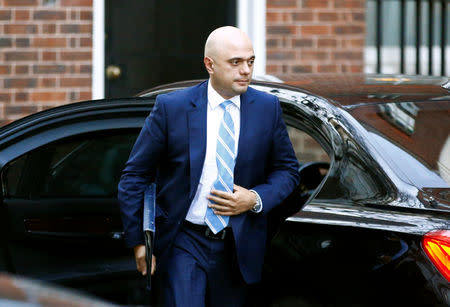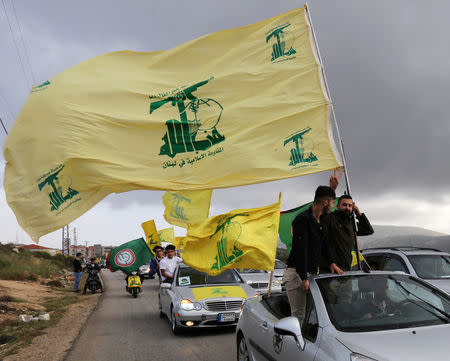Britain to expand ban on Lebanon's Hezbollah, calling it terrorist group
By Michael Holden LONDON (Reuters) - Britain said on Monday it plans to ban all wings of Hezbollah due to its destabilizing influence in the Middle East, classing the Lebanese Islamist movement as a terrorist organization. London had already proscribed Hezbollah's external security unit and its military wing in 2001 and 2008 respectively, but now wants to outlaw its political arm too. Hezbollah has a role in the Lebanese government so the move may raise questions for Britain's relationship with Lebanon, although Lebanon's Hezbollah-allied foreign minister said the UK had informed the country of its commitment to the bilateral relationship. "Hezbollah is continuing in its attempts to destabilize the fragile situation in the Middle East – and we are no longer able to distinguish between their already banned military wing and the political party," British Home Secretary (interior minister) Sajid Javid said. "Because of this, I have taken the decision to proscribe the group in its entirety," he added in a statement. The Iran-backed Shi'ite group is already deemed a terrorist organization by the United States, which last week expressed concern about its growing role in Lebanon's government. Hezbollah lawmakers termed that a "violation of sovereignty". The British ban, which will come into force on Friday subject to parliamentary approval, means anyone who is a member of Hezbollah or invites support will be committing a criminal offense with a potential sentence of up to 10 years in jail. ISRAEL: EU SHOULD FOLLOW SUIT Explaining its decision, the British government said the organization continued to amass weapons in contravention of U.N. Security Council resolutions, while its support for Syrian President Bashar al-Assad had prolonged "the conflict and the regime's brutal and violent repression of the Syrian people". There was no immediate reaction from Hezbollah. Lebanese Foreign Minister Gebran Bassil, a political ally of the group, said the British move would not have a negative impact on Lebanon and that Britain had informed Lebanon of its commitment to bilateral ties. However, in comments reported by the National News Agency, he also defended the group, whose arsenal has been a focal point of political division for years in Lebanon. "If the whole world stood up and said the resistance is terrorism, this does not make it terrorism as far as the Lebanese are concerned," said Bassil, who is also a son-in-law of Lebanon's president and leads the political party he founded. Hezbollah now controls three of 30 ministries in Lebanon's government, the largest number it has ever held, and has seen its regional clout expand too with fighters in various Middle East conflicts including neighboring Syria. It does not acknowledge the existence of separate wings. Hezbollah's lifelong enemy, Israel, thanked Javid. "All who truly wish to combat terror must reject the fake distinction between 'military' & 'political' wings," Israeli Security Minister Gilad Erdan said in a tweet. "Now is the time for the #EU to follow suit!" In Britain, Hezbollah has been a topic of internal political controversy, with opposition leader Jeremy Corbyn criticized by opponents for once calling the group friends. "What do we see from his Labour Party? Hamas and Hezbollah friends, Israel and the United States enemies," Prime Minister Theresa May said last week in parliament. (Reporting by Michael Holden in London, Tom Perry in Beirut; Editing by Guy Faulconbridge, Andrew Cawthorne and Frances Kerry)



